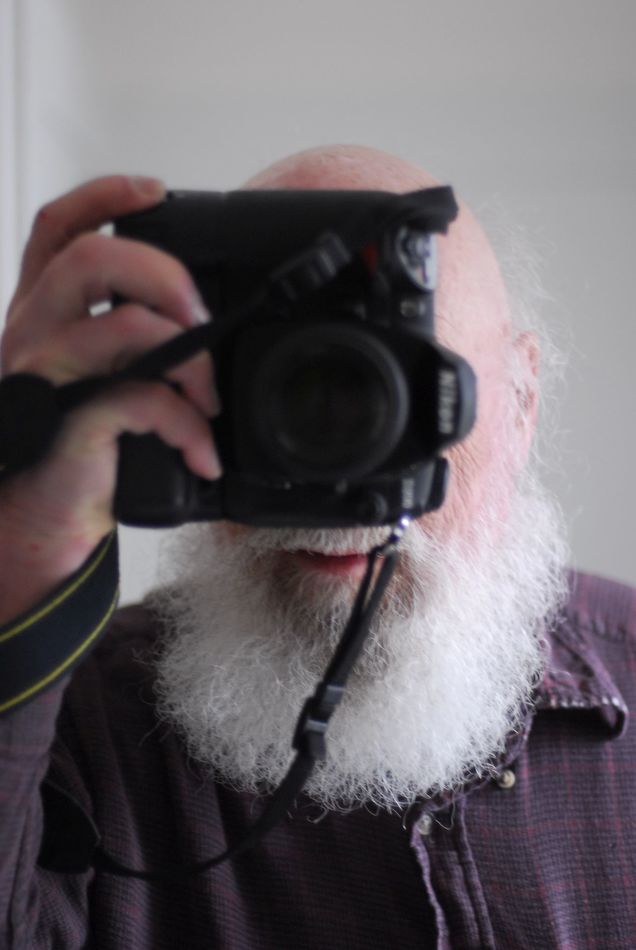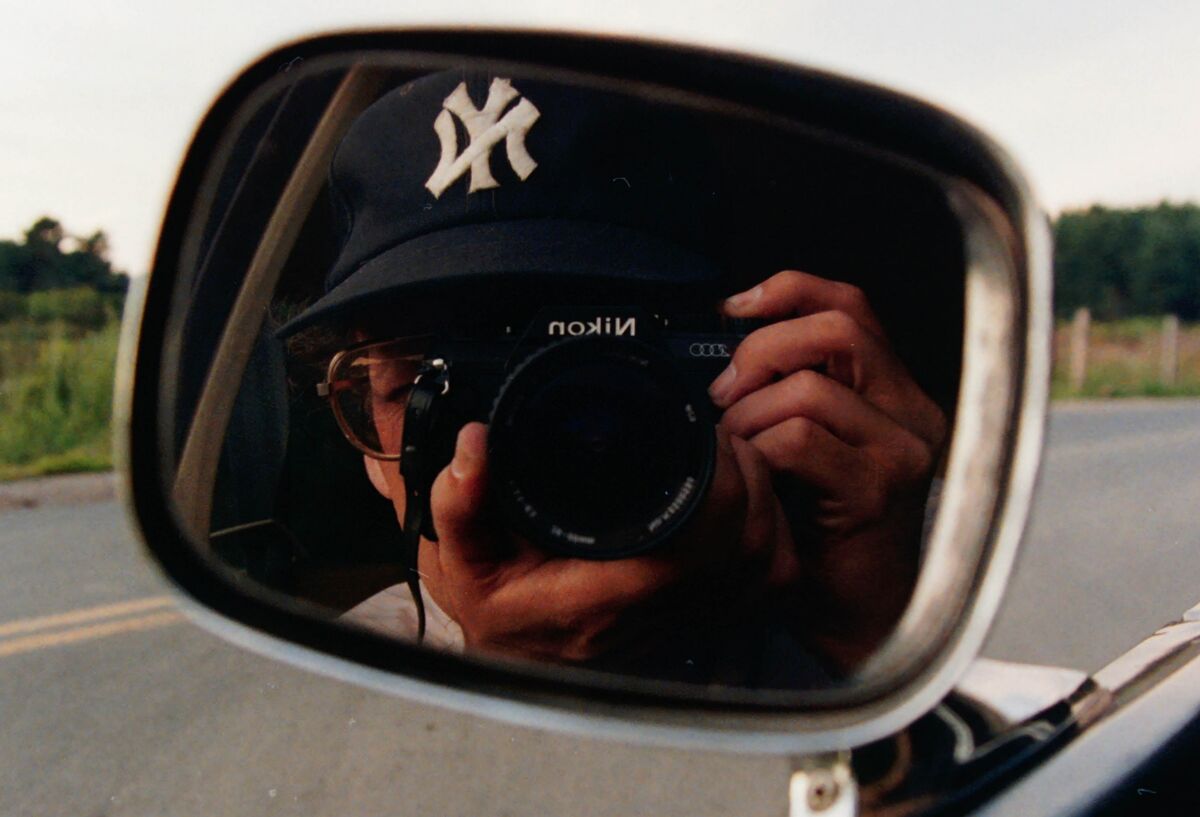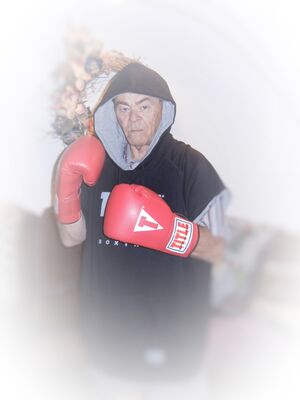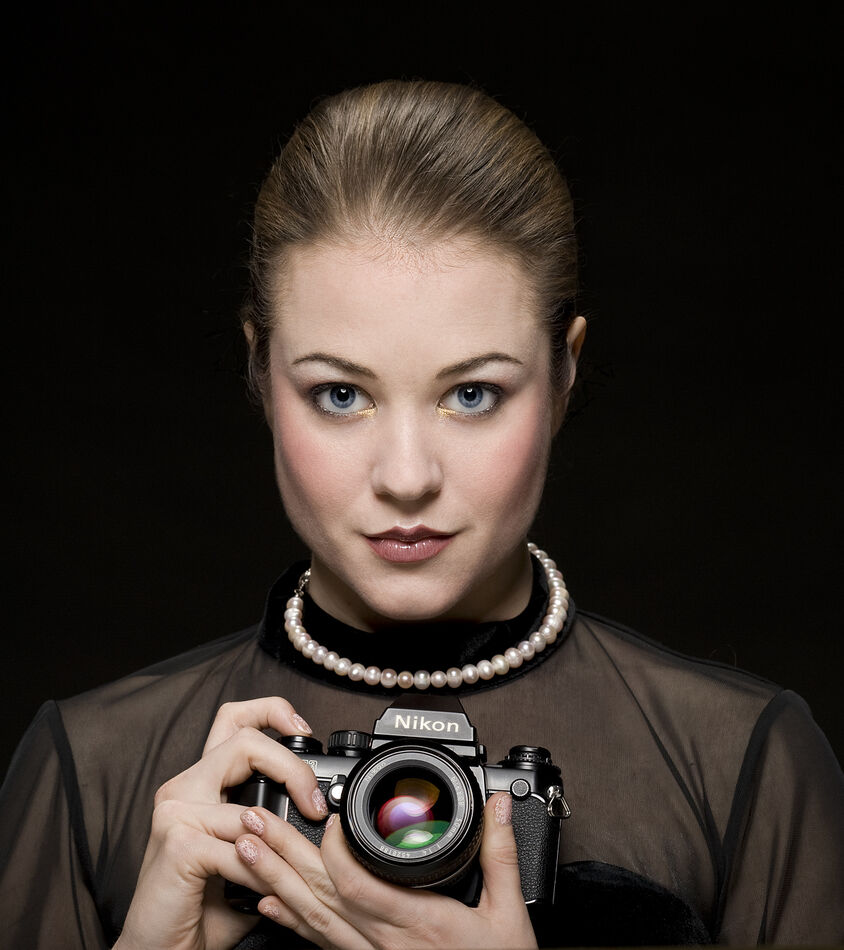As others see us!
Dec 5, 2021 18:08:48 #
Gourmand wrote:
Please take this well meaning advice in the spirit it is intended. I see the potential for unintended camera shake. The goal in how one holds their camera is to provide as much stability as possible. Imagine holding a rifle the way you are holding your lens, and then think about how Real Nikon Lover is holding his. Sgt. Baker would have been yelling all afternoon if he'd seen one of us do otherwise (bootcamp days).
You do realize he is simply posing for a picture...right?
Dec 5, 2021 18:27:59 #
yorkiebyte wrote:
Noap. I have more hair. And a proper Nikon. 



I have more hair too (or at least I did in 2007). I call it compensatory hypertrophy.

Dec 5, 2021 18:43:40 #
RightOnPhotography
Loc: Quebec,QC
flyboy61 wrote:
How we appear...
Canon camera with a biiiig lens - must be a pro photographer 😁
Dec 5, 2021 19:17:34 #
There is a reason I like BIG cameras, they hide my face. My face can stop an 8-day clock and cause it to run backward!
Dec 5, 2021 19:20:57 #
While trying to be diplomatic, my main reason for the post is that I know there are many beginners who are picking up all sorts of tips on UHH. If just one of them reads through all this and changes the way they've been holding their camera; well, they will have made my day. Happy shooting to all!
Dec 5, 2021 21:40:55 #
Gourmand wrote:
While trying to be diplomatic, my main reason for the post is that I know there are many beginners who are picking up all sorts of tips on UHH. If just one of them reads through all this and changes the way they've been holding their camera; well, they will have made my day. Happy shooting to all!
When I first read this thread, I thought of it as how photographers are perceived by other folks or how we "look" while taking pictures and operating cameras. I did not think of it as a tutorial on camera ergonomics and methods of holding the camera steady to avoid blur, etc. You do, however, make a good point.
Fortunately, a camera is not quite a dangerous as a loaded firearm. If we hold it improperly we will not be injured by the recoil, or accidentally kill anyone or ourselves by losing control of the weapon. Worst case scenario, we drop it on a hard surface and incur a nasty repair bill.
As for the actual camera handlg technique, I suppose I can write a book- at least a decent essay. Besides steadiness, there are many other aspects. There is very basic stuff that, as important as it seems, is often excluded from these online conversations.
Lots depend on the photographers, dexterity, the equipment in use, the ergonomics design into the care or the lack thereof of those aspects. Not everyone has the same physical attributes or deficits and different jobs and different gear require different approaches. You do not need to be a ballet dancer, an acrobat, or an athlete to have a natural sense of balance, most folks do, otherwise, they would all fall over when they walk or drop everything they carry. I do not think there are uniform instructions that apply to every person and every camera. If a person has a particular weakness in any of their muscles, they will natualrr learn to compensate by altering their grip, position, or stance and figure out a workaround method. Others might require some additional aids such as tripods, monopods, belt pods, various brackets or grips, or some other form of improvisation utilizing straps.
There are certain kinds of work that requr very precise camera positioning in relation to the subject. In portraiture, for example, it is critical that the photograph asses the lighting, expression and position and expression in the eyes for the camera position and be able to direct the subject and evoke expression from behind the camera. If you ask the subject to "look at me" and you are standoff the subject lens axis, the chances are, you will get off-center or vaccine expressions in the eyes or lose "viewer eye contact" with the subject. It is important that you can hold the camera steady or use a tripod and have comfortable access to the viewfinder at all camera positon and elevations.
If for some reason you are forced to use a slower shutter speed in a handheld situation, you need to practice camera steadiness as to how you are gonna brace yourself and the camera. Even your breathing control is important and the way you squeeze the shutter release. If you are using a long or heavy lens, you need to find the camera's center of gravity and balance accordingly. Sometimes you may need to improvise steadiness by utilizing a wall, ledge, tree, pillar or pole for additional support.
Think of the old proverbial "one-armed wallpaper hanger" and do not try a one-handed grip just to look savvy and cool. This is not a sick joke- I once trained a veteran who lost part of his arm in a firearms accident, in wedding photography, in the days of film press cameras. He managed to shoot smoothly, fast and well.- extremely well! If you have both arms and hands use them! Get a grip! Select equipment that is compatible withte the size and strength of your hands. Practice and learn to operat your camera without havg to fumble with the controls. With practice, you will develop "musical memory" like typing or playing a musical instrument and various operations will become second nature.
Once the came becos an extension of you hands, it will more easily become an extension of your heart, your mind, and your imagination.
Dec 5, 2021 23:01:48 #
Longshadow wrote:

Aside from the fact that it makes the camera more stable.
Elbows close to my stomach (body) also in most cases.
(Yea, I'm old... )
)


Aside from the fact that it makes the camera more stable.
Elbows close to my stomach (body) also in most cases.
(Yea, I'm old...
 )
)That's the way I learned to hold a camera.
Dec 6, 2021 11:07:28 #
In support of Longshadow's comments, probably the most common obstacle to gripping a camera well is encountered by left-handed people - cameras are not designed to be used by them except in portrait orientation. With time, even a convoluted grip will become second nature, but why not start with the grip that is most likely to provide the greatest stability. Almost all the other positioning and holding techniques for a steady shot with a rifle apply to a camera, and should become second nature themselves with regular application. If you are a beginner, take these comments to heart in the spirit that they are being offered up and try them out. When you're done, get a very good tripod and have someone teach you how to use it (its a bit more sophisticated than it looks or sounds). There's an old saying: "if you want a sharper lens, get a tripod".
Dec 6, 2021 14:24:10 #
Gourmand wrote:
...probably the most common obstacle to gripping a camera well is encountered by left-handed people - cameras are not designed to be used by them except in portrait orientation...
Left eyed people have some problems too, but they are not that pronounced.
Aug 8, 2022 15:57:00 #
flyboy61
Loc: The Great American Desert
E.L.. Shapiro wrote:
There is a reason I like BIG cameras, they hide my face. My face can stop an 8-day clock and cause it to run backward!


Aug 8, 2022 16:05:26 #
Aug 8, 2022 17:03:47 #
Longshadow wrote:
My left hand is UNDER the lens, camera resting on the heel of my hand.
That was necessary with a manual focus lens. Still stuck with me as I moved to AF. This was with MF.

Aug 8, 2022 17:17:42 #
Aug 8, 2022 23:18:38 #
Viewing this thread is very sad and reminds me why I continue to hang out on Flickr and IG.
Please try it folks, there are actually many many highly skilled commercial photographers aboard those platforms.
And their work towers over anything I'm finding on UHH now.
Except possibly for the UHH Sports Photographer's Forum, which still has skilled commercial photographers posting.
Steve Perry is gone...
The Captain is gone...
This list goes on and on...
Below is a Lifestyle Editorial of a very dear colleague from NYC...
Illustrated: A vintage Nikon F3 (35mm SLR) with 50mm 1.4 Nikkor Lens
Photography & Make-up: Yours Truly
Venue: My Studio in Reston
Shoot Data:
Camera: Nikon D3
Lens: AF 200mm Micro Nikkor f/4D IF-ED
Illumination: White Beauty Dish with Grid & Sock.
Best Advice to anyone left on UHH that actually wants to shoot commercially.
Assist other commercial shooters in your market, this has been my path for decades
And I still get booked as a makeup artist by my peers in the industry.
btw, I hold a Cosmetologist License in Makeup Artistry from the state of Maryland.
This allows me to get gigs in local beauty salons...
Commercial Photography is all about team synergy, the photographer is only one player in the mix and many times under the guidance of the shoot's creative director.
Once again, please go join flickr and IG if you actually want to run with the best of the best...
Words of wisdom I've received from many of those I've assisted.
"You are only as good as the weakest image in your book"
Think very carefully before you post anything, anywhere if you hope to make it in a highly competitive marketplace.
Please try it folks, there are actually many many highly skilled commercial photographers aboard those platforms.
And their work towers over anything I'm finding on UHH now.
Except possibly for the UHH Sports Photographer's Forum, which still has skilled commercial photographers posting.
Steve Perry is gone...
The Captain is gone...
This list goes on and on...
Below is a Lifestyle Editorial of a very dear colleague from NYC...
Illustrated: A vintage Nikon F3 (35mm SLR) with 50mm 1.4 Nikkor Lens
Photography & Make-up: Yours Truly
Venue: My Studio in Reston
Shoot Data:
Camera: Nikon D3
Lens: AF 200mm Micro Nikkor f/4D IF-ED
Illumination: White Beauty Dish with Grid & Sock.
Best Advice to anyone left on UHH that actually wants to shoot commercially.
Assist other commercial shooters in your market, this has been my path for decades
And I still get booked as a makeup artist by my peers in the industry.
btw, I hold a Cosmetologist License in Makeup Artistry from the state of Maryland.
This allows me to get gigs in local beauty salons...
Commercial Photography is all about team synergy, the photographer is only one player in the mix and many times under the guidance of the shoot's creative director.
Once again, please go join flickr and IG if you actually want to run with the best of the best...
Words of wisdom I've received from many of those I've assisted.
"You are only as good as the weakest image in your book"
Think very carefully before you post anything, anywhere if you hope to make it in a highly competitive marketplace.
If you want to reply, then register here. Registration is free and your account is created instantly, so you can post right away.







